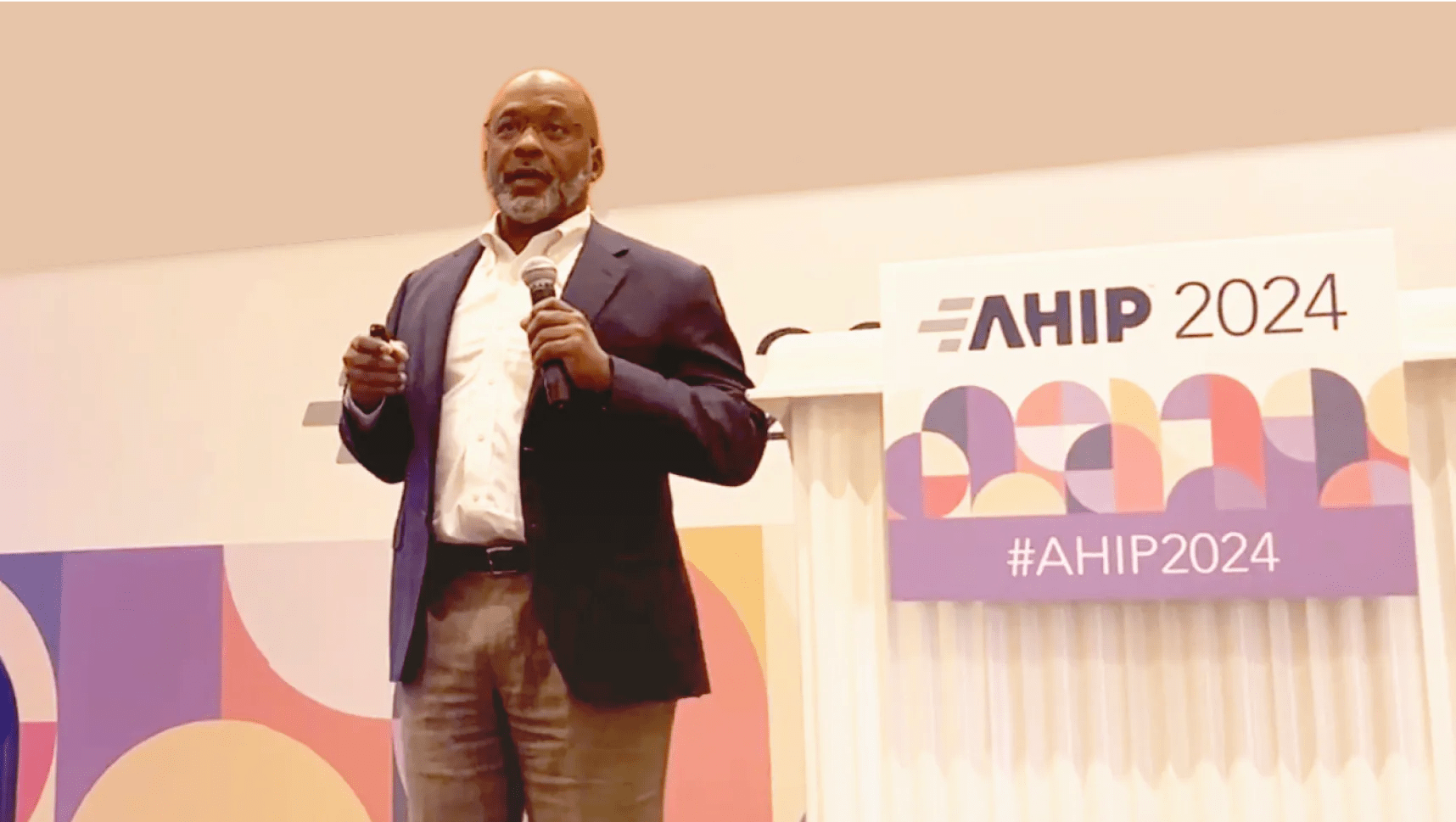Advancing care delivery in a rapidly changing landscape

The Verily team recently attended AHIP 2024, the leading industry conference for health insurance plans, and joined discussions on the current challenges health plans face, as well as the solutions needed for driving improved outcomes in the future. Speakers and sessions covered some of the most important topics in healthcare today, including health equity, the use of AI in healthcare, and the emerging challenges of high-cost treatments like GLP-1s.
At the conference, Verily announced Verily Lightpath Metabolic, which will be a comprehensive, flexible care solution* for health plans to help their members manage multiple cardiometabolic conditions across acuity levels, such as a clinically-guided weight loss program inclusive of anti-obesity medications, such as GLP-1s (when clinically indicated).**† Verily leaders covered details on the launch and the opportunities ahead to deliver more equitable, precise and scalable virtual care* through a combination of AI-powered features and deep clinical expertise, to be available for open enrollment January 2026.
Building equitable foundations
Achieving equitable health outcomes continues to be a healthcare industry challenge. Systemic issues such as insufficient measurement make it difficult for organizations to know where they can be most effective. Experts weighed in on where to start, and how to think about prioritizing health equity to drive impact in their organizations.
In the panel discussion, Assessing the Measurable Impact of Equity on Outcomes, Kelli Tice, MD of Guidewell and Florida Blue joined Kendell LeBray, MPH (HCSC), LaShawn McIver, MD, MPH (AHIP) and Verily’s Chief Clinical Officer and Health Equity Lead, Vindell Washington, MD, MS, to discuss health equity data challenges and other areas that hold companies back from advancing equitable outcomes. She highlighted the importance of creating alignment across cost, impact and return on investment to understand how health disparities impact medical costs. A key challenge has been data, and according to Dr. Tice, “We’ve been telling ourselves we don’t have the data. But really, we have been really accustomed to only putting out the positive data.” Despite the challenges with measurement, all panelists emphasized the importance of not being "paralyzed by not having the perfect thing" for improving health equity, and the need to think about equity as a foundational pillar of the products being built. Dr. Washington shared a working philosophy that underscores Verily’s product development approach, “Equity can’t be an appendage to the work we do. One of the guiding product inclusion principles is that health equity doesn’t sit to the side of the solution.”

AI for equitable outcomes
Quality data is critical for AI and machine learning to avoid the risk of reinforcing bias and disparities. This means health organizations need to ensure they have both representative data collected and effective models to measure for equity in order to affect positive change. Dr. Washington posed the question for measuring equity, “Are plans and providers really able to look at those populations that are often left behind?”, and he shared how Verily is approaching equity issues with research of a new data science framework — termed the equitable restless multi-armed bandit (ERMAB) — to optimize care for more equitable outcomes.
The ERMAB approach helps evaluate whether desired clinical outcomes are being achieved across many different care scenarios and optimizes toward the more effective care paths. Instead of optimizing care across a total population, the ERMAB algorithm is able to model for improvement within individual sub-groups. This approach builds on a commonly used data science modeling technique known as a restless multi-armed bandit (RMAB), used by companies such as Spotify and StitchFix to power recommendations. In healthcare, researchers have used RMABs to make improvements like computing optimal cancer screening regimens, improving maternal health with telehealth and planning hepatitis-C treatment delivery.
Verily’s new concept consists of applying a reinforcement learning approach to allocate resources toward care delivery dynamically, using an RMAB model but optimizing resources within a number of representative sub-groups. There has often been the worry that bias and inequity can be a “side effect” of AI in healthcare. Verily believes that AI techniques such as ERMABs can be used to directly address the problem.

Navigating the nuances of
GLP-1s
Glucagon-like peptide-1 (GLP-1) is a hormone produced by the small intestine that has many cardiometabolic effects. For type 2 diabetes (T2D), the GLP-1 class of medications mimic the body’s hormone to help control insulin and lower blood glucose. For weight loss, they produce positive effects by reducing appetite, slowing stomach emptying, and increasing feelings of fullness. GLP-1s are generating significant excitement in the medical community due to their promising role beyond cardiometabolic health management, such as the ability to help slow kidney damage in people with T2D and chronic kidney disease, as well as use for obstructive sleep apnea.
Blood glucose control for diabetes and obesity are some of the FDA-approved GLP-1 indications, but off-label weight-loss use is a mounting concern. Clinical, and non-clinical, complexities, such as differences between drugs, side effects, availability and costs must be considered. This is the approach driven by the American Diabetes Association’s (ADA) Standards of Care in Diabetes, which emphasizes prescribing all glucose-lowering medications for T2D based on both clinical and patient-centric factors, such as personal preference, access, and social determinants of health.
This surge of interest has raised numerous questions that require scientific scrutiny, especially for use in weight loss and obesity. During AHIP, leaders from Highmark, NYU Langone Health, WeightWatchers, and the Institute for Clinical and Economic Review discussed some of the complexities associated with GLP-1 usage. Despite reports of successful outcomes, several critical questions remain unanswered:
- How long should individuals use GLP-1s?
- Are there genetic differences for therapeutic response?
- How do you prevent rebound?
- How do you prevent gastric dysmotility and muscle loss?
Longer-term measurement and observational studies are needed to address these questions in order to better understand safety and efficacy to optimize treatment plans. Additionally, given the financial burden, the costs versus the benefits of GLP-1s remain unclear. Health plans are grappling with the challenge of this issue and justifying use for broader populations, while direct-to-consumer companies are making these medications accessible to those who can afford them for weight loss.
A patient-centered approach
Verily Lightpath's clinical team has identified seven pillars to medication adherence — the extent to which certain factors, including a person’s diet, lifestyle and medication taking behaviors, match with clinical recommendations. In line with the ADA’s approach, they also believe behavior change support should often precede the use of GLP-1 medications, while motivating patients to effectively leverage both digital and medicinal resources. Given the significant costs and shortages of GLP-1s, it’s even more essential to develop personalized and integrated solutions.
Verily’s Lightpath Metabolic virtual care solution will support various levels of acuity for diabetes, obesity, hypertension, hyperlipidemia and other conditions, allowing members to move between programs, and based on clinical indications, access to telemedicine, medication management, health coaching and advanced digital tools, for a personalized and comprehensive approach. Lightpath Metabolic is designed to also incorporate equitable modeling and additional AI tools, which will be available to members of health plans and employer benefits programs beginning January 1st, 2026.
It's taking years of experience providing clinical care with a full-stack care team, and applying that in a new digital experience that represents an upgrade in terms of delivering on both patient engagement and empowerment.
Myoung Cha, Verily Chief Product Officer
Defining a new path for precision health
There are no shortcuts with chronic care management. AI tools will be a critical feature to advance precision health, but expert clinicians and coaches serving members will always be at the center. “We must strike a balance between transformative technologies and human touch to make programs like Lightpath work”, Dr. Washington said. Verily aims to use AI and its wealth of data to drill down to the "n of one" for a truly personalized experience. “AI gives us the ability to adjust and pinpoint levels of intensity”, as Myoung Cha, Verily’s Chief Product Officer discussed in the Lightpath announcement. “Lightpath will be an evolution of Verily Onduo, building upon Verily’s foundational principles of personalized, equitable and evidence-based care strategies.”
Lightpath Metabolic is being designed to include AI capabilities, learning from the substantial clinical interactions that took place within the Onduo program, and from that foundation, building AI capabilities on a responsive chronic care platform. Through this as well as continuous data integration, health coaches and a deep bench of licensed clinical experts, Lightpath is intended to be a truly differentiated offering.
Lightpath is planned to be available for open enrollment for health plans and self-insured employers in January 2026.* Learn more about Verily Lightpath, or connect with an expert.
Sources & disclaimers
* The information contained on this page is intended to outline Verily’s general product direction and is not a commitment or legal obligation to deliver any functionality. Product capabilities, timeframes and features are subject to change and should not be viewed as commitments. Connect with an expert for questions, including the latest product information.
** Verily Life Sciences LLC (“Verily”) offers virtual care management programs for eligible individuals, as further described in these materials and at verily.com. Verily collaborates with Onduo Management Services LLC (“OMS”), Onduo LLC, and a network of affiliated Professional Entities to offer the services. These services are meant to be used in conjunction with regular in-person clinical services and not intended to replace routine primary care.
†Statements related to Rx treatments are for members receiving telemedicine services with licensed health care providers through Onduo P.C.


